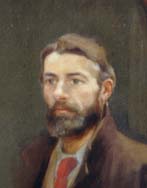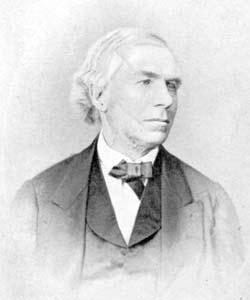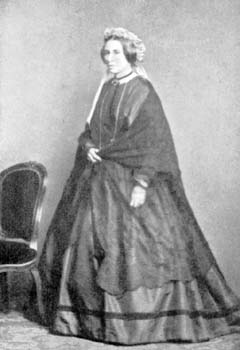 |
MY DAYS AND DREAM Edward Carpenter's Autobiography |
| The Edward Carpenter Archive by Simon Dawson |
Chapter 2 - My Parents
Forward to Chapter 3 - Cambridge
 |
MY DAYS AND DREAM Edward Carpenter's Autobiography |
| The Edward Carpenter Archive by Simon Dawson |
My father (born in 1797) had a curious early life. He came of a family which had lived in Cornwall (Launceston) for some generations. He was the only son - though he had three sisters - of an Admiral in the Navy, and appears to have taken to his father's profession, when a boy, as a matter of course. He was not, however, at all suited to it, for he was of a rather studious temperament, and the rough life of the Navy of those days was probably very distasteful to him, He was in one or two skirmishes with the French off the American coast, and I remember his telling me of the painful feeling which he experienced once when being in a small boat and coming across some French sailors in another small boat he had to take aim and fire at them. To his relief, however, no one was hurt!

MY FATHER : CHARLES CARPENTER
When he was twenty-three or twenty-four my father began to learn German and read philosophy in his spare hours, which did not look as though he were destined to remain long on board ship! As a matter of fact he left the Navy when he was about twenty-five. The bad climate of Trincomalee, where he was stationed for two years, damaged his health. He came to London and set about reading for the Chancery Bar, in due course he was called and for some years practised with success - so much so indeed that on his retirement he was greatly complimented by the presiding judge. In 1833 he married; and this it was which, curiously enough, led to his retirement from the Bar. For his father-in-law - Thomas Wilson - who had also been in the Navy, and who was then a widower, only consented to the marriage on condition that his daughter should remain at home, and that the married couple should therefore take up their abode at his house at Walthamstow. This they did, and the distance from London, a considerable matter in those days, combined perhaps with a little anxiety about my father's health, which still remained unsatisfactory, brought about the abandonment of his profession - a great mistake as it appeared, for of course as soon as he lost his regular occupation he began to worry badly. Then, when Mr. Wilson died in 1843, a move to Brighton (which just then was growing into importance, and yet retained some of its old-world character) was thought advisable, both for my father's sake and for that of the little family which now had to be considered. But as far as my father was concerned this did not mend matters, and my mother has often told me that this was the worst period of their married life.
He got more and more anxious and restless - to a degree which seemed almost a danger to his mind - till at last my mother induced him to let himself be appointed magistrate and take his seat on the Brighton bench; after which his serenity returned, and he remained one of the most active and probably the most public spirited of the members of the Brighton and afterwards of the Hove magistracy till a year or two before his death. The death of his own father in 1846 freed him from any real cause for pecuniary anxiety - though from time to time all through his later life he was liable to fits of considerable depression and nervousness about his monetary concerns. He settled down permanently at Brighton (No. 45 Brunswick Square) into the life of the respectable rentier, with its usual aims and ideals as far as his family was concerned, though for himself his aims were very different from those of the society round him, and his conception of life was as broad as it could well be upon the foundation of that particular social status to which he belonged.
His early life in the Navy had given my father that honest, somewhat simple, cast of mind which belongs to sea-faring folk. He was always ready to be impressed by a tale of distress especially if it came from the lip's of one of the fair sex. At the same time his active brain had carried him far in most fields of thought. Though having a strong religious feeling, he soon emancipated himself from current orthodoxies in religion, and seldom in later Life went to church - a fact which to the mild respectabilities around us was a sufficient justification for calling him an Atheist. For Frederick W. Robertson, who was then preaching at Brighton, and who not unfrequently came to our house, and for Frederick D. Maurice, however, he had a great admiration; and his own views were - as far as I remember what he said when I was a boy - a kind of Broad Church mysticism, derived at first from reading S. T. Coleridge (whom he had met occasionally in former years in London), and gradually broadening out under the influence of Eckhardt, Tauler, Kant, Fichte, Hegel and others into a religious and philosophic mysticism without much admixture of the Broad Church at all.
In politics he was a strong Liberal - indeed in his most active period a philosophic Radical of the Mill school, and gave strong support to Henry Fawcett during the time when the latter represented Brighton. Though occasionally asked to stand himself he never as far as I know felt inclined to do so, and indeed a certain lack of glibness and difficulty of expression which he experienced always made him disinclined from taking part in any kind of public speechifying. In his quite latest years he veered round to the support of Beaconsfield's Government; but this, if partly due to the reactionary tendency of old age, was also caused by his keen perception of the hypocrisy (unconscious or otherwise) of Gladstone, whom in the last few years of his life he never ceased to vilify. Almost all general literature interested my father - especially works on natural history, travels, and science of any kind; but art and music were never much in his line. Any tale of heroism, or prodigy of science would bring ready tears to his eyes; and his love of reading - as in the case of his own father - lasted to the latest years of his life; for when he was over eighty years of age he would not unfrequently sit up till one or two in the morning, conning the last new book or running over favorite passages of his philosophical authors.
In a letter of his (written in '73) I find the following passage: "Circumstances have been leading me to think a good deal lately about Instinct. I do not see how any distinction can be drawn between what we call Instinct in the lower animals - such as the insect when she deposits eggs and then brings to the place of deposit the food needful for the support of her offspring grub, and covering them up (eggs and food) together, flies away to perish - and that power in Plants that causes them to send forth their roots often to a great distance and in a special direction, in search of the material needful for their nutriment, the mineral perhaps without which they could not live. This can only be understood, as it seems to me, upon the assumption of there being a Life, an intelligent Life, in the Plant or Insect, of which they are unconscious. Think of the Swallow going to Egypt perhaps, and then at proper season returning to its old nest under the eaves of some cottage in England. The possession of sense-organs, therefore, does not expel from the Bird or Fish this Intelligent Life within them, which orders their migrations, etc., but of which they are unconscious. And why should it be otherwise with man? That he should be conscious of this life will one day be his highest blessing."
And in another letter (of 1876): "Surely the true meaning of Nirvana is that at some future stage of our being man will be so conscious of the indwelling and inworking of Deity, that he will ascribe every movement, whether of his body or mind, to the One Will, the One Vernunft, the One Life, and thus think of himself as swallowed up by and absorbed, as it were, in that Being."
These extracts will show what a priceless debt I owe to the early contact with his mind.
How strange and far-back all that early life seems now - and yet so vivid - I can see it all in brightest detail! Of an evening, after dinner or supper, how we sat round the drawing-room table, or in scattered chairs, reading. My father would get out his Fichte or his Hartmann and soon become lost in their perusal. Occasionally he would, when he came to a striking passage, play a sort of devil's tattoo with his fingers on the table, or, getting up, would walk to and fro quarter-deck fashion, with creaky boots, and reciting his authors to himself. Then my mother or perhaps my eldest sister would remonstrate, and after a time he would settle down again. Sometimes if he was very quiet one might look up from one's book and see from his upturned eyes and half-open lips that he had lapsed into inner communion and meditation.
His was a very religious nature, and it was his habit to think of the divinity as clearly present - as he would say: "When I am taking my bath or even when I am breathing I say to myself, 'This is God working within and around me.'" In later years, however, his liability to extreme worry and anxiety would return; and there were times when even his books failed to save him from the sleepless nights and despondent days occasioned by the failure or possible failure of some Stock Exchange speculation. At such times reports of railway companies, maps, gazetteers, newspaper cuttings, etc., were got out and studied and restudied; I was called in to take part in the investigations ("put in the stocks" as I used to call it), and had to sit up till the small hours of the morning in attitudes of painful suspense and tension. The troubles, however, would pass away in due time, and on the whole my father was (owing chiefly to the care and thought he gave to them) very successful over his "investments."
The rest of the family spent the evening, as a rule, in reading - of which we were all fond. My sisters would play or sing a little; and when they ceased, the sound of the near sea would reassert itself, or the roaring of the wind in the chimney. My mother sat on a low chair, with a book on her knee and some knitting in her hands, but occasionally, tired with the work of the day, would drop asleep; at ten o'clock the servant brought up wine and biscuits, and shortly afterwards we would all - except my father - retire.
Of my mother's life how can I say anything? That which is so vital to one, so intimate, how can one disengage it from oneself? There was an unspoken tragedy in those beautiful gazelle-like eyes - the tragedy as of dumbness itself. The tender loving spirit which beamed forth from them never found direct utterance in this world. It was the look of a prisoner. Her mother was a Scotchwoman. A baneful parental influence - Scottish pride and Puritanism - had rested on my mother's young life, making all expression of tender feeling little short of a sin and this reserve, inculcated in youth, became in later days involuntary and inevitable. My mother had a Sister to whom she was much attached, but who had offended my grandmother by marrying a man who was considered undesirable. The sister was never forgiven, nor even acknowledged again. She died soon after her marriage; and her death, with all the accompanying circumstances, was a great blow to my mother; but of it - as of other things which touched her nearly - she would never speak.
Her nature was not so much intellectual or imaginative as practical and prompt to act, with a kingly sense of duty and courage. Her life was one long self-sacrifice - first to her parents, then to her husband and children. All day and much of the night, without haste and without rest, she went about the house attending to our young wants, to my father's comfort, and to the organization of a large household - wearing herself daily to a thinner and slighter frame, which even in age seemed by this means to maintain its activity - till at last when her children were grown up, and her husband's growing infirmities demanded the services of a trained nurse, there came upon her the grievous sense - not the less grievous because wholly unwarranted - that she was "no longer of any use in the world." Twice, I remember, she repeated these fatal words; and then, not long after, a brief attack of bronchitis parted easily the thread of life, already worn so fine. The manner of her death was as heroic as that of her life, with thought in lucid intervals for all around her, servants, and everybody in the house; and with closing smile, and words of calm, "All is as it should be."
When my mother died (in January 1881 my father - who had been for the most part absorbed in business or philosophic speculations, and who had given indeed too little time to personal matters - suddenly became aware of the greatness of the loss he had sustained. He woke up from dreamland when it was too late. My mother's silent and untiring forethought had unconsciously to himself been the great support and directing power of his life; and now he ceased not to say, "The mainspring is broken, the mainspring is broken." His infirmities, which at eighty-three years of age were the natural ills of senile decay; rapidly gained upon him, and a year afterwards, in April 1882, he died and was laid in the same grave with her - in Hove cemetery, between the sea and the Downs, close to the little church to which, years before, we as children had trudged with these our parents every Sunday by the fields and footpaths which then separated the village of Hove from the growing West of Brighton.

MY MOTHER : SOPHIA WILSON CARPENTER (ABOUT 1864)
My mother had very gracious manners, of gently-smiling dignity, yet her inflexible sense of truth and justice - inflexible especially as regards her own life and conduct - was easily apparent beneath the gentle exterior. Her ideas of social demarcation, etc., were of course of the old school; and she looked upon it quite as a duty to keep up a certain position in society - as the phrase is. Indeed, though much of the social life of Brighton was in reality irksome to her, I think that she never questioned the duty of conforming to it. But then - unlike many modern mistresses - she never questioned the duty of attending to the wants of dependents; and her care for the interests of the household servants, and others whom misfortune might bring to her door, was most unfailing and most sincere. The servants in fact were as a rule much devoted to her - though she was by no means lax in matters of discipline and daily superintendence.
A great feature of my mother's character was her love of animals, especially dogs and horses. Outdoor and garden occupations she was also fond of - and I believe her natural inclination would have led her to a rural life. But Brighton offered nothing in this direction - and here again the promptings of her nature were destined only to be thwarted.